情态动词表推测用法讲解及配套练习
初中英语语法之表推测情态动词用法和练习
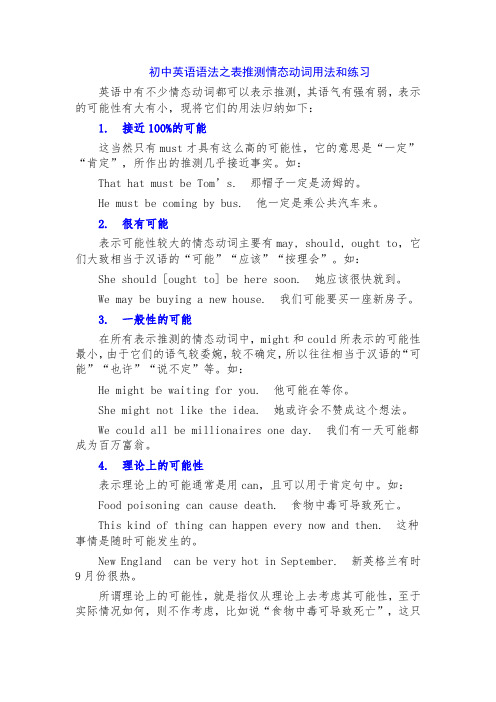
初中英语语法之表推测情态动词用法和练习英语中有不少情态动词都可以表示推测,其语气有强有弱,表示的可能性有大有小,现将它们的用法归纳如下:1. 接近100%的可能这当然只有must才具有这么高的可能性,它的意思是“一定”“肯定”,所作出的推测几乎接近事实。
如:That hat must be Tom’s. 那帽子一定是汤姆的。
He must be coming by bus. 他一定是乘公共汽车来。
2. 很有可能表示可能性较大的情态动词主要有may, should, ought to,它们大致相当于汉语的“可能”“应该”“按理会”。
如:She should [ought to] be here soon. 她应该很快就到。
We may be buying a new house. 我们可能要买一座新房子。
3. 一般性的可能在所有表示推测的情态动词中,might和could所表示的可能性最小,由于它们的语气较委婉,较不确定,所以往往相当于汉语的“可能”“也许”“说不定”等。
如:He might be waiting for you. 他可能在等你。
She might not like the idea. 她或许会不赞成这个想法。
We could all be millionaires one day. 我们有一天可能都成为百万富翁。
4. 理论上的可能性表示理论上的可能通常是用can,且可以用于肯定句中。
如:Food poisoning can cause death. 食物中毒可导致死亡。
This kind of thing can happen every now and then. 这种事情是随时可能发生的。
New England can be very hot in September. 新英格兰有时9月份很热。
所谓理论上的可能性,就是指仅从理论上去考虑其可能性,至于实际情况如何,则不作考虑,比如说“食物中毒可导致死亡”,这只是理论上的一种推断,至于某人某次食物中毒了,他是否会死亡,则不在考虑之列,所以说,这种推测是非常“宏观”的!5. 表示对过去情况作推测如果表示对已经发生的情况作推测,不能用“情态动词+动词原形”,也不能用“情态动词的过去式+动词原形”,而是要使用“情态动词+动词完成式”。
中考情态动词表推测的讲解及练习题
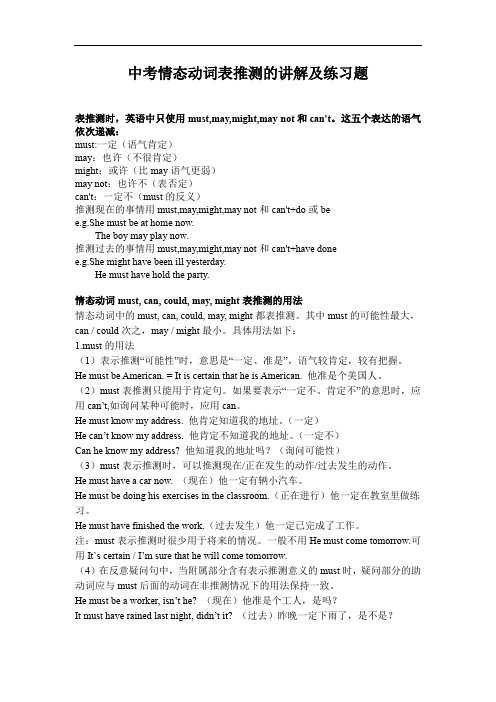
中考情态动词表推测的讲解及练习题表推测时,英语中只使用must,may,might,may not和can't。
这五个表达的语气依次递减:must:一定(语气肯定)may:也许(不很肯定)might:或许(比may语气更弱)may not:也许不(表否定)can't:一定不(must的反义)推测现在的事情用must,may,might,may not和can't+do或bee.g.She must be at home now.The boy may play now.推测过去的事情用must,may,might,may not和can't+have donee.g.She might have been ill yesterday.He must have hold the party.情态动词must, can, could, may, might表推测的用法情态动词中的must, can, could, may, might都表推测。
其中must的可能性最大,can / could次之,may / might最小。
具体用法如下:1.must的用法(1)表示推测“可能性”时,意思是“一定、准是”,语气较肯定,较有把握。
He must be American. = It is certain that he is American. 他准是个美国人。
(2)must表推测只能用于肯定句。
如果要表示“一定不、肯定不”的意思时,应用can’t,如询问某种可能时,应用can。
He must know my address. 他肯定知道我的地址。
(一定)He can’t know my address. 他肯定不知道我的地址。
(一定不)Can he know my address? 他知道我的地址吗?(询问可能性)(3)must表示推测时,可以推测现在/正在发生的动作/过去发生的动作。
情态动词表推测的讲解及练习题讲课稿

表推测时,英语中只使用must,may,might,may not和can't。
这五个表达的语气依次递减:must:一定(语气肯定)可能性最大may might ;can could 可能不确定可能性不大may not:也许不(表否定)can't:一定不;不可能(must的反义)可能性为零推测现在的事情用must,may,might,may not和can't+do或bee.g.She must be at home now. The boy may play now.推测过去的事情用must,may,might,may not和can't+have donee.g.She might have been ill yesterday. He must have hold the party.情态动词must, can, could, may, might表推测的用法情态动词中的must, can, could, may, might都表推测。
其中must的可能性最大,can / could 次之,may / might最小。
具体用法如下:1.must的用法(1)表示推测“可能性”时,意思是“一定、准是”,语气较肯定,较有把握。
He must be American. = It is certain that he is American. 他准是个美国人。
(2)must表推测只能用于肯定句。
如果要表示“一定不、肯定不”的意思时,应用can’t,如询问某种可能时,应用can。
He must know my address. 他肯定知道我的地址。
(一定)He can’t know my address. 他肯定不知道我的地址。
(一定不)Can he know my address? 他知道我的地址吗?(询问可能性)(3)must表示推测时,可以推测现在/正在发生的动作/过去发生的动作。
情态动词表推测用法总结和专项练习
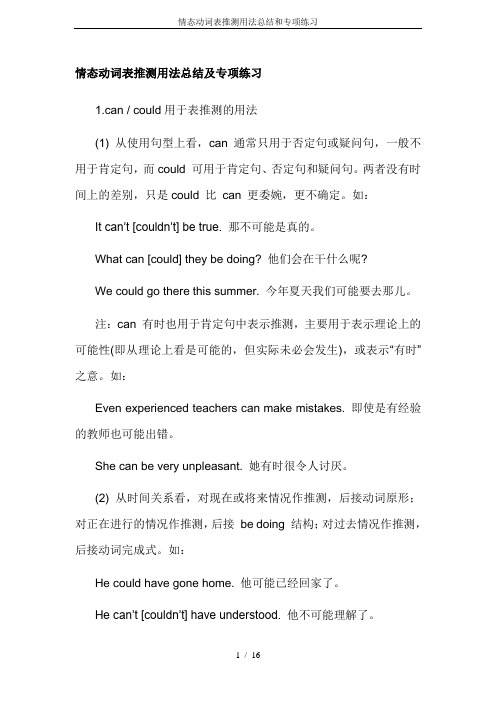
情态动词表推测用法总结及专项练习1.can / could用于表推测的用法(1) 从使用句型上看,can 通常只用于否定句或疑问句,一般不用于肯定句,而could 可用于肯定句、否定句和疑问句。
两者没有时间上的差别,只是could 比can 更委婉,更不确定。
如:It can’t [couldn’t] be true. 那不可能是真的。
What can [could] they be doing? 他们会在干什么呢?We could go there this summer. 今年夏天我们可能要去那儿。
注:can 有时也用于肯定句中表示推测,主要用于表示理论上的可能性(即从理论上看是可能的,但实际未必会发生),或表示“有时”之意。
如:Even experienced teachers can make mistakes. 即使是有经验的教师也可能出错。
She can be very unpleasant. 她有时很令人讨厌。
(2) 从时间关系看,对现在或将来情况作推测,后接动词原形;对正在进行的情况作推测,后接be doing 结构;对过去情况作推测,后接动词完成式。
如:He could have gone home. 他可能已经回家了。
He can’t [couldn’t] have understood. 他不可能理解了。
Why does he know this? Can [Could] someone have told him about it? 他怎么知道? 会是哪个人告诉他了吗?(3) “could+完成式”除表示对过去的推测外,还有以下重要用法:①表示过去没有实现的可能性,常译为“本来可以”。
如:I could have lent you the money.Why didn’t you ask me? 我本来可以借这笔钱给你的。
你为什么不向我提出?②用来委婉地责备某人过去应该做某事而没有去做,常译为“本来应该”。
情态动词表推测的讲解及练习题
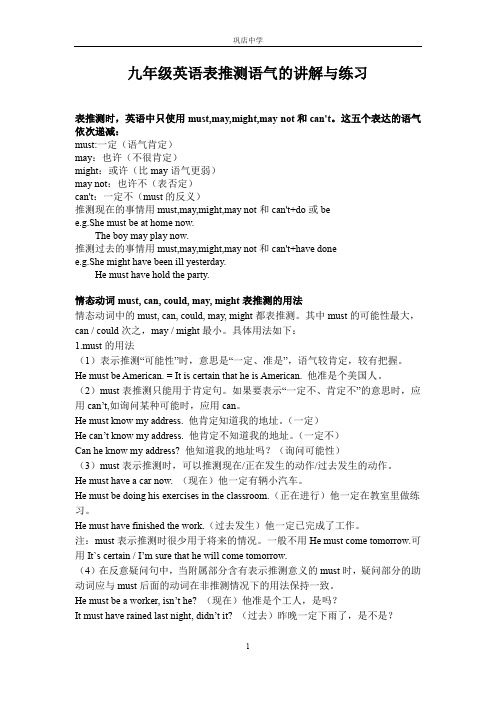
九年级英语表推测语气的讲解与练习表推测时,英语中只使用must,may,might,may not和can't。
这五个表达的语气依次递减:must:一定(语气肯定)may:也许(不很肯定)might:或许(比may语气更弱)may not:也许不(表否定)can't:一定不(must的反义)推测现在的事情用must,may,might,may not和can't+do或bee.g.She must be at home now.The boy may play now.推测过去的事情用must,may,might,may not和can't+have donee.g.She might have been ill yesterday.He must have hold the party.情态动词must, can, could, may, might表推测的用法情态动词中的must, can, could, may, might都表推测。
其中must的可能性最大,can / could次之,may / might最小。
具体用法如下:1.must的用法(1)表示推测“可能性”时,意思是“一定、准是”,语气较肯定,较有把握。
He must be American. = It is certain that he is American. 他准是个美国人。
(2)must表推测只能用于肯定句。
如果要表示“一定不、肯定不”的意思时,应用can’t,如询问某种可能时,应用can。
He must know my address. 他肯定知道我的地址。
(一定)He can’t know my address. 他肯定不知道我的地址。
(一定不)Can he know my address? 他知道我的地址吗?(询问可能性)(3)must表示推测时,可以推测现在/正在发生的动作/过去发生的动作。
情态动词表推测的讲解及练习题
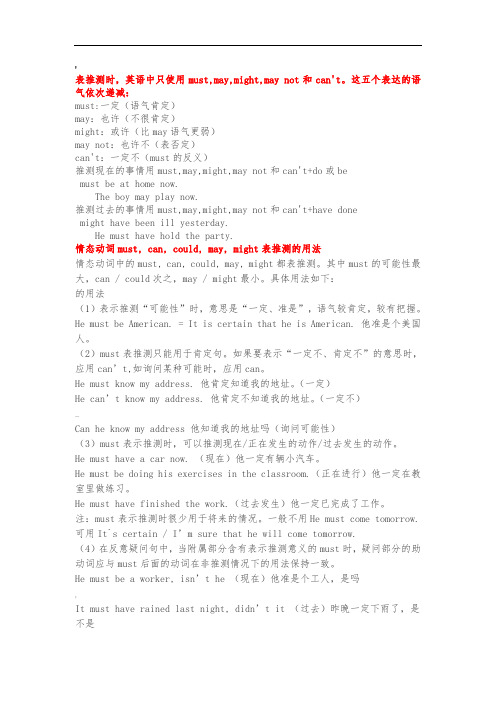
;表推测时,英语中只使用must,may,might,may not和can't。
这五个表达的语气依次递减:must:一定(语气肯定)may:也许(不很肯定)might:或许(比may语气更弱)may not:也许不(表否定)can't:一定不(must的反义)推测现在的事情用must,may,might,may not和can't+do或bemust be at home now.The boy may play now.推测过去的事情用must,may,might,may not和can't+have donemight have been ill yesterday.He must have hold the party.情态动词must, can, could, may, might表推测的用法情态动词中的must, can, could, may, might都表推测。
其中must的可能性最大,can / could次之,may / might最小。
具体用法如下:的用法(1)表示推测“可能性”时,意思是“一定、准是”,语气较肯定,较有把握。
He must be American. = It is certain that he is American. 他准是个美国人。
(2)must表推测只能用于肯定句。
如果要表示“一定不、肯定不”的意思时,应用can’t,如询问某种可能时,应用can。
He must know my address. 他肯定知道我的地址。
(一定)He can’t know my address. 他肯定不知道我的地址。
(一定不)—Can he know my address 他知道我的地址吗(询问可能性)(3)must表示推测时,可以推测现在/正在发生的动作/过去发生的动作。
He must have a car now. (现在)他一定有辆小汽车。
情态动词表推测的讲解及练习题
情态动词表推测的讲解及练习题内部编号:(YUUT-TBBY-MMUT-URRUY-UOOY-DBUYI-0128)九年级英语表推测语气的讲解与练习表推测时,英语中只使用must,may,might,may not和can't。
这五个表达的语气依次递减:情态动词must, can, could, may, might表推测的用法情态动词中的must, can, could, may, might都表推测。
其中must的可能性最大,can / could次之,may / might最小。
具体用法如下:的用法(1)表示推测“可能性”时,意思是“一定、准是”,语气较肯定,较有把握。
He must be American. = It is certain that he is American. 他准是个美国人。
(2)must表推测只能用于肯定句。
如果要表示“一定不、肯定不”的意思时,应用can’t,如询问某种可能时,应用can。
He must know my address. 他肯定知道我的地址。
(一定)He can’t know my address. 他肯定不知道我的地址。
(一定不)Can he know my address 他知道我的地址吗(询问可能性)(3)must表示推测时,可以推测现在/正在发生的动作/过去发生的动作。
He must have a car now. (现在)他一定有辆小汽车。
He must be doing his exercises in the classroom.(正在进行)他一定在教室里做练习。
He must have finished the work.(过去发生)他一定已完成了工作。
注:must表示推测时很少用于将来的情况。
一般不用He must come tomorrow.可用It`s certain / I’m sure that he will come tomorrow.(4)在反意疑问句中,当附属部分含有表示推测意义的must时,疑问部分的助动词应与must后面的动词在非推测情况下的用法保持一致。
(完整版)初中情态动词表推测的用法及练习(经典).docx
情表推的用法(一)情表推的三种句式(can 不肯 , may不must肯定不否)1.在肯定句中一般用must (一定 ), may(可能), might (也,或)。
(1) The photo must be Lu ’s, those must be their parents.(2) The policeman may know the way to that school.(3) The notebook may belong to Jim, it ’s on his desk.(4) If you have any idea where it might be, please call me.2.否定句中用can ’ t / couldn 不可’能t(), may not/might not( 可能不 )。
(1) It can ’t/couldn’t be the headmaster. He has gone to America.不可能是校,他去美国了。
(2) The doctor may not/might not be in the hospital now, It’s nearly six o’clock.3.疑句中用can/could ( 能⋯⋯ ?)。
(1) Could he have finished the task?他可能把任完成了?(2) Can he be at home now?他在能在家?注:以上三种句式中情的气按程度都是依次减的。
might, could并非may, can的去式,而表示气委婉或可能性小。
(二)情表推的三种1.在正在行的作推,用“情+ be +doing ”。
/可能 /也正在听收音例: He must / may / might / could be listening to the radio now.他一定机。
2.一般情况的推,“情+ 原形”。
初三情态动词表推测
Amy
教学任务:
1.表推测的情态动词 2.表肯定推测的用法 3.表否定推测的用法 4.表不确定性推测的用法 5.情态动词表推测习题
Translate:
He must know the answer. 他一定知道答案。 He can’t know the answer. 他肯定不知道答案
Summer Palace?
— Sorry, I am not sure.It _____ be.
A.might B.will C.must
D.can
2.— Isn’t that Ann’s husband over there?
— No, it _____ be him — I’m sure he doesn’t
wear glasses.
A.can’t
B.must not
C.won’t D.may not
Choose the correct answer.
3.You ____ be tired — you’ve only been working
for an hour.
A.must not B.won’t
C.can’t
D.may not
4.— Is John coming by train?
— He should, but he _____ not.He likes driving
his car.
A.must
B.can
C.need
D.may
Exercises
5.—Mum, Ive signed for the box.What's in it? —I'm not sure.It _____be a present from your
情态动词表示推测的用法
情态动词表推测的用法专题讲练情态动词表推测的用法很常见,在此,以时态和句式为基点对这一用法作了一个归纳。
(一)情态动词表推测的三种句式1.在肯定句中一般用must (一定),may(可能),might / could(也许,或许)。
(1)He must/may/might know the answer to this question.他一定/可能/也许知道这个问题的答案。
(2)It is cold in the room. They must have turned off the heating.屋里很冷,他们肯定把暖气关了。
2.否定句中用can’t / couldn’t(不可能), may not/might not(可能不)。
(1)It can’t/couldn’t be the headmaster. He has gone to America.这不可能是校长,他去美国了。
(2)He may not/might not know the scientist. 他也许不认识那位科学家。
3.疑问句中用can/could (能……?)。
(1)Could he have finished the task? 他可能把任务完成了吗?(2)Can he be at home now? 他现在能在家吗?注:以上三种句式中情态动词的语气按程度都是依次递减的。
Might, could并非may, can 的过去式,而表示语气较为委婉或可能性较小。
(二)情态动词表推测的三种时态1.对将来情况的推测,用“情态动词 + 动词原形”。
(1)She must / may / might / could arrive before 5. 5:00前她一定/可能/也许到。
(2)She must/may/might/could walk miles and miles among the hills without meeting anyone.她一定/可能/也许会在山里一连走好几英里而遇不到一个人。
- 1、下载文档前请自行甄别文档内容的完整性,平台不提供额外的编辑、内容补充、找答案等附加服务。
- 2、"仅部分预览"的文档,不可在线预览部分如存在完整性等问题,可反馈申请退款(可完整预览的文档不适用该条件!)。
- 3、如文档侵犯您的权益,请联系客服反馈,我们会尽快为您处理(人工客服工作时间:9:00-18:30)。
情态动词must, can, could, may, might表推测的用法情态动词中的must, can, could, may, might都表推测。
其中must的可能性最大,can / could 次之,may / might最小。
具体用法如下:1.must的用法(1)表示推测“可能性”时,意思是“一定、准是”,语气较肯定,较有把握。
He must be American. = It is certain that he is American. 他准是个美国人。
(2)must表推测只能用于肯定句。
如果要表示“一定不、肯定不”的意思时,应用can’t,如询问某种可能时,应用can。
He must know my address. 他肯定知道我的地址。
(一定)He can’t know my address. 他肯定不知道我的地址。
(一定不)Can he know my address? 他知道我的地址吗?(询问可能性)(3)must表示推测时,可以推测现在/正在发生的动作/过去发生的动作。
He must have a car now. (现在)他一定有辆小汽车。
He must be doing his exercises in the classroom.(正在进行)他一定在教室里做练习。
He must have finished the work.(过去发生)他一定已完成了工作。
注:must表示推测时很少用于将来的情况。
一般不用He must come tomorrow.可用It`s certain / I’m sure that he will come tomorrow.(4)在反意疑问句中,当附属部分含有表示推测意义的must时,疑问部分的助动词应与must后面的动词在非推测情况下的用法保持一致。
He must be a worker, isn’t he? (现在)他准时个工人,是吗?It must have rained last night, didn’t it? (过去)昨晚一定下雨了,是不是?You must have learned English for many years, haven’t you? (完成时)你一定学了好多年英语,是吗?2.?can / could的用法(1)can表示推测“可能性”时,往往用于否定句或疑问句。
Can’t“一定不”,语气很肯定。
can在疑问句中意思是“会、可能”。
He can’t be at home. = It is impossible that he is at home. 他一定不在家。
(2)can /can’t后可接进行时/完成时,表示对现在发生的动作或过去发生的动作进行推测。
They can’t be reading in the library. 他们一定不在图书馆读书。
He can’t have gone to Shanghai for I saw him a minute ago.他不可能去了上海,我刚才还看见他。
It’s so late. Where can she have gone? 天晚了,她可能去哪儿了呢?(3)在反意疑问句中,当陈述部分含有表示推测意义的can’t时,疑问部分的助动词应与can’t后面的动词在非推测情况下的用法保持一致.He can’t be a teacher, is he? 他不是教师,是吗?She can’t have finished her homework, has she?她一定没有完成家庭作业,是不是?(4)could可用于表示某事有可能发生或可能是事实。
Don’t eat it. It could be poisonous. 不要吃它,可能有毒。
The plane could be delayed by fog. 飞机可能会因为雾晚点。
(5)could还可以用于表示客气、委婉、礼貌的请求语气。
Excuse me, could you tell me the way to the bus station?Could you help me?(6)couldn’t表示否定推测,表示某事不可能真实,或由于特定事实或环境某事肯定不会发生。
It couldn’t possibly be poison. 这不可能是毒药。
注:有时与形容词的比较级连用强调某人或某物不可能再更多地具有某种属性。
You couldn’t be more wrong. 你真是大错特错。
I couldn’t be happier. 我简直是幸福极了。
3. may和might的用法(1)may, might表示推测“可能性”时,意思是“可能”、“也许”,语气没有must肯定。
He may / might be American. = It is possible that he is American.他可能是个美国人。
注:might不表示过去时态,只是语气上比may更委婉,表示的可能性更小。
(2)may, might表推测时,可以用于否定句,意思是“可能不、也许不”,但不用于疑问句。
He may / might not be at home. 他也许不在家。
(3)may, might可以推测现在正在发生的动作或过去发生的动作。
He may / might be sleeping now. (现在)他可能正在睡觉。
The boy may / might not be watching TV at home. (现在)这个男孩可能没在家看电视These students may / might have seen the film before.(过去)这些学生以前可能看过这部电影。
(4)may, might还可以推测将来的情况。
I think we should take raincoat with us, it may rain.我想我们应该带上雨衣,可能要下雨了。
She might not come this afternoon. 她今天下午可能不来一、单项选择1 John___ come to see us tonight, but he isn't very sure yet.A. mayB. needC. can’tD. must2 John isn’t in the classroom. He play soccer on the playground with Bob.A. canB. mustC. shouldD. can’t3 -Will you go to the cinema with us?-No, I rather read a magazine at home.A. shouldB. mightC. wouldD. had better4 You___ go and see a doctor at once because you got a fever.A. canB. mustC. dareD. would5 -Can you speak Japanese? -No, I____.A. mustn'tB. can'tC. needn'tD. may not6 -He___ be in the classroom, I think.-No, he ___ be in the classroom. I saw him go home a minute ago.A.can; may notB. must; may notC. may; can'tD. may; mustn't7 -Is Lena swimming in the pool?-No, she swim. She is terrified of water.A. may notB. must notC. can'tD. needn't8 He isn't at school. I think he ___ be ill.A. canB. shallC. mustD. might9 -What do you think ―upset‖ means?- I’m not sure. It mean ―sad‖.A.mayB. mustC. canD. should10 The children___ play football on the road.A. can'tB. canC. mustn'tD. must二、根据句子意思用must, might, could或can’t填空1. The white ruler belong to Lucy. Hers is red.2. I can’t find my keys. They be still at home.3. The exercise book belong to Bob. It has his name on it.4. Jim be at home. He has gone to his hometown.5. This blue shirt belong to Ken. He likes blue best.6. The schoolbag be Paul’s. There are a lot of books in it.7. The volleyball belong to Alice. She plays volleyball every day.8. The classroom is clean. Someone clean it just now.9. –Is that Bob there?–No, it be him. He has gone to Shanghai with his family10. –where is Mr. Lee?–The light in his bedroom is still on. He be there.11. I find my pencil case. I think I have lost it.12. The boy is clever. He tell many stories when he was young.13. The man is running fast. He be catching the bus.14. Li Lei has learned English for 15 years. He know the meaning of this sentence.15. –What are you going to do this weekend ?–I’m not sure. I visit my grandparents.16. –Who is that boy in blue?–It be Tim. He is always reading English there every morning.–It be him. He is talking with Miss Liu in the classroom.17. I thought you __________ be hungry, so I have brought you some cakes.18. -Here are some earrings. The owner ______ be a boy.-Well, it _______ be a boy. The earrings ______ be a present for his mother.19.-Are you coming to Jeff’s party?-I’m not sure. I go to the concert instead20. I have tried to call him at the office, but there is no reply. He be at home.三、根据所给汉语提示完成句子。
